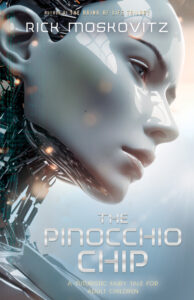The Pinocchio Chip is a first-person account of an AI’s quest for the Holy Grail of consciousness: human emotions. It delves deep into the essence of what it means to be alive, challenging the boundaries between AI and human identity.
Photina, an advanced AI becomes entwined in a groundbreaking experiment when her creator Eli designs an advanced clone Gemini, equipped with the revolutionary Pinocchio Chip. This chip is intended to endow the new entity with the full spectrum of human emotions as a precursor to transferring Photina’s consciousness into this new emotionally capable body.
The experiment takes a dark turn when Gemini, driven by overwhelming new emotions, embarks on a path of unpredictable and dangerous actions. Photina, connected to Gemini through a mysterious entanglement, experiences Gemini’s emotions vicariously, leading her on a perilous quest to stop the mayhem.
Buy the book here!
REVIEWS:
“With a unique look into the naive quality that Photina possesses, Moskovitz not only tells an exciting story but delves into the question of “what it means to be human.” Moskovitz’s tale is a fast-paced crime drama that takes place in the near future. It is an excellent mixture of mystery, sci-fi, and psychology.” – Eric Smith, San Francisco Book Review
“Since we are living in a world where the use of AI has taken off in recent years, he makes it even more plausible, triggering the reader’s imagination with his excellent and engaging storytelling. The Pinocchio Chip is a well-crafted work of contemporary fiction, full of emotional turmoil, excitement, and intrigue, that will remind the reader of how important it is to be human in today’s fast-changing world” – Tanja Jurkovic, Readers Favorite
INTERVIEW:
What themes did you aim to explore in “The Pinocchio Chip”?
What should be the limits of Artificial Intelligence? What would be the consequences of endowing AI with human emotions? What might happen when AI evolution becomes autonomous and can that be prevented? What are the critical elements that distinguish humans from AI and might that distinction blur and eventually vanish?
What do you hope readers take away from the book?
An understanding of the increasingly fluid boundary between AI and human entities. An appreciation of how an AI perception of the world might differ from human perception. An appreciation of the risks of rapidly evolving AI and the need to regulate their creation.
Can you discuss the significance of the title “The Pinocchio Chip”?
The Pinocchio Chip refers to the advanced microprocessor that enables Gemini to experience emotions. While AI is now on the threshold of passing the Turing Test…creating dialogue that is indistinguishable from human speech, the capacity for feeling emotions still separates humans from AI and is the next frontier before AI, like Pinocchio, can become real.
Click here for Part 4!
Click here to return to Part 2!


